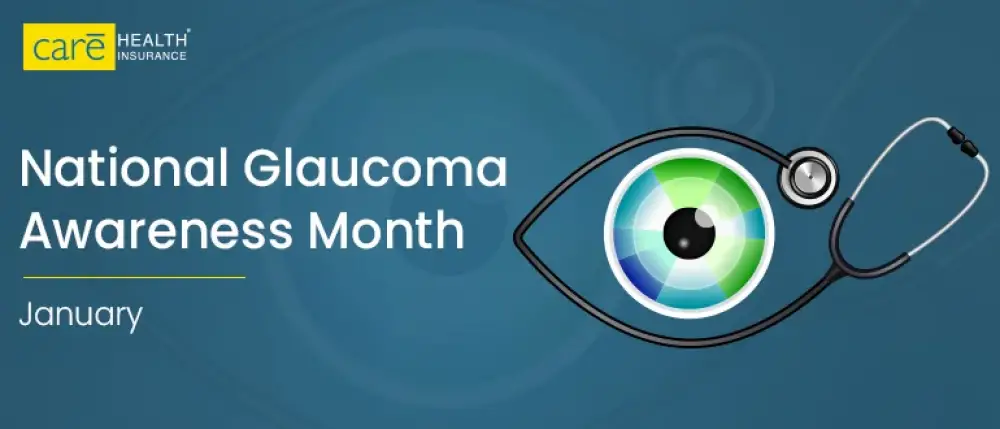Subscribe to get weekly insights
Always stay up to date with our newest articles sent direct to your inbox
Published on 7 Jan, 2025
Updated on 8 Jan, 2025
278 Views
4 min Read

Written by Anjali Sharma
Reviewed by Rashmi Rai
favorite3Likes
Glaucoma is one of the leading causes of irreversible blindness worldwide. What makes it even more alarming is that many people don’t even realise they have it until significant vision loss has occurred. That’s why Glaucoma Awareness Month is crucial in shining a light on this condition.
This month is a call to action for everyone to prioritise their eye health, learn about the risks, and take proactive steps to protect their vision. Whether it is through routine eye exams, understanding the symptoms, or spreading awareness, this is your chance to help preserve the gift of sight for yourself and your loved ones.
Glaucoma Awareness Month plays a vital role in highlighting the early detection, education, and prevention of glaucoma-related vision loss.
Glaucoma is an eye condition that happens when the pressure inside the eye becomes too high, damaging the optic nerve responsible for sending images to the brain. If not treated on time, this optic nerve damage can lead to vision loss or even blindness. Early detection and diagnosis are important to manage Glaucoma effectively and prevent vision loss.
Each type of Glaucoma presents unique challenges and requires tailored treatment to manage it effectively. Early detection through regular eye exams is critical for preserving vision and maintaining eye health.
Protecting your eyes from glaucoma involves proactive steps to detect and manage the condition before it causes irreversible damage. By incorporating these practices into your daily routine, you can significantly reduce the risk of developing glaucoma and protect your vision for years to come. Regular monitoring, medication adherence, and a healthy lifestyle are the keys to long-term eye health.
Glaucoma Awareness Month is a powerful reminder that protecting your eyesight is important yet often overlooked. Early detection through regular eye exams is the key to preserving your vision and preventing the silent damage caused by glaucoma. By staying informed, you safeguard your eyes and empower those around you to take proactive steps in maintaining their eye health.
However, managing your vision health goes beyond awareness; it is about being prepared for the unexpected from the early stages of life. That’s where the right health insurance plan comes in. It helps you monitor your vision health and other potential health issues that may damage your vision in the long run.
Disclaimer: The above information is for reference purposes only. Kindly consult your general physician for verified medical advice. The health insurance benefits are subject to policy terms and conditions. Refer to your policy documents for more information.
References:
https://www.med.unc.edu/ophth/2023/12/january-glaucoma-awareness-2024/
https://www.nei.nih.gov/sites/default/files/2019-06/5-things-to-know-about-glaucoma.pdf
https://glaucoma.org/articles/january-is-glaucoma-awareness-month
Thyroid : मामूली नहीं हैं महिलाओं में थायराइड होना, जानें इसके लक्षण और घरेलू उपचार Vipul Tiwary in Diseases
शुगर कंट्रोल कैसे करे? जानें, डायबिटीज में क्या खाना चाहिए Vipul Tiwary in Health & Wellness
हाई ब्लड प्रेशर को तुरंत कंट्रोल कैसे करें? देखें इसके उपाय Vipul Tiwary in Diseases
पैरों में दर्द किस कमी से होता है? जानें, इसके घरेलू इलाज Vipul Tiwary in Health Insurance Articles
National Newborn Care Week: Every Touch, Everytime, Every Baby! Mudit Handa in Awareness Days
Pancreatic Cancer Awareness Month: Shine a Light for Early Detection! Mudit Handa in Awareness Days
Lung Cancer Awareness Month: Breaking Barriers to Champion the Cause Mudit Handa in Awareness Days
World Immunization Day: Attaining Physical and Financial Immunity Mudit Handa in Awareness Days
Always stay up to date with our newest articles sent direct to your inbox
Loading...